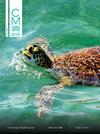太平洋中深水的鱼类组合:墨西哥大陆和海洋岛屿的比较
IF 0.7
4区 生物学
Q4 MARINE & FRESHWATER BIOLOGY
引用次数: 2
摘要
中光生态系统位于海洋深处,由入射光的数量(地表光的1%-10%)决定。这些生态系统在许多地区仍未被探索,包括墨西哥海岸的太平洋地区,因为使用传统方法(如水肺)很难进入这些生态系统。使用远程操作的飞行器,我们对加利福尼亚湾大陆岛屿和墨西哥Revillagigedo群岛海洋岛屿周围中生深度的岩石和沙子栖息地的鱼类组合进行了表征。我们进行了78次视频样带调查,并将观察到的鱼类确定为尽可能低的分类水平。利用每个视频样带的物种存在,我们计算了每个岛屿群和栖息地类型的传统多样性指数(物种丰富度、分类清晰度和营养水平)和功能指数(功能实体数量、功能丰富度和功能体积)。模型结果表明,生境类型是预测中生鱼类多样性的最重要因素。海洋岛屿的岩礁的功能指数显示出比沙质栖息地更高的值,这主要是由于蓝鳃类和商业上重要的跨太平洋物种的存在。虽然分类学的独特性和功能多样性的价值可能表明海洋岛屿群中的中生珊瑚礁比大陆岛屿周围的中生礁更具生态完整性,这将需要更多的探索来确定这种情况是否会随着时间的推移而持续,以及这些生态系统是否可以作为商业鱼类物种的避难所,以应对影响浅层珊瑚礁的越来越多的干扰。本文章由计算机程序翻译,如有差异,请以英文原文为准。
Fish assemblages at mesophotic depths in the Pacific: a comparison between continental and oceanic islands of Mexico
Mesophotic ecosystems are found at depths of the ocean defined by the amount of incident light (1%–10% of light found at the surface). These ecosystems remain unexplored in many regions, including the Pacific region along the coast of Mexico, given the difficulty of accessing them using traditional methods, such as scuba. Using a remotely operated vehicle, we characterized fish assemblages across rock and sand habitat at mesophotic depths around continental islands in the Gulf of California and oceanic islands in the Revillagigedo Archipelago in Mexico. We conducted 78 video-transect surveys and identified observed fish to the lowest taxonomic level possible. Using species’ presence per video-transect, we calculated traditional diversity indices (species richness, taxonomic distinctness, and trophic level) and functional indices (number of functional entities, functional richness, and functional volume) for each island group and habitat type. The model results indicated that habitat type was the most important factor for predicting mesophotic fish diversity. The functional indices showed higher values for the rocky reefs of oceanic islands than for the sandy habitats, driven primarily by the presence of elasmobranchs and commercially important transpacific species. While the values of taxonomic distinctness and functional diversity could indicate that the mesophotic reefs in the oceanic island group are more ecologically intact than those around the continental islands, it will require more exploration to determine if this condition persists over time and if these ecosystems could serve as refuges for commercial fish species against the increasing number of disturbances impacting shallow reefs.
求助全文
通过发布文献求助,成功后即可免费获取论文全文。
去求助
来源期刊

Ciencias Marinas
生物-海洋与淡水生物学
CiteScore
1.10
自引率
0.00%
发文量
9
审稿时长
>12 weeks
期刊介绍:
A bilingual open-access publication, Ciencias Marinas (CM) is an international peer-reviewed journal that contains original research findings in all areas of marine science. It is published quarterly by the Autonomous University of Baja California, Mexico, and all its contents are publicly available on our journal website. Though a limited number of copies are still printed, the journal is mainly distributed in its electronic format.
CM was conceived in 1973 as part of an academic project aimed to entice local researchers to publicly disclose their findings by adopting the culture of peer-review publishing. This academic project evolved into an international journal after accepting papers from researchers in the United States and, eventually, other parts of the world. Because of the diversity in authorship, CM issues were initially published in either Spanish or English, and occasionally in both languages. It was not until 1984 when CM included both language versions of all its contents, and it then became the fully bilingual journal it still is today. At CM we believe our inclusive format allows us not only to address a wider range of submissions from international authors but also to make published findings available to a wider international audience.
So whether you are looking for information on the redfish in Icelandic waters or the physical and biological properties of the Gulf of California, feel free to peruse CM contents. You may find them to provide source material for your research.
 求助内容:
求助内容: 应助结果提醒方式:
应助结果提醒方式:


